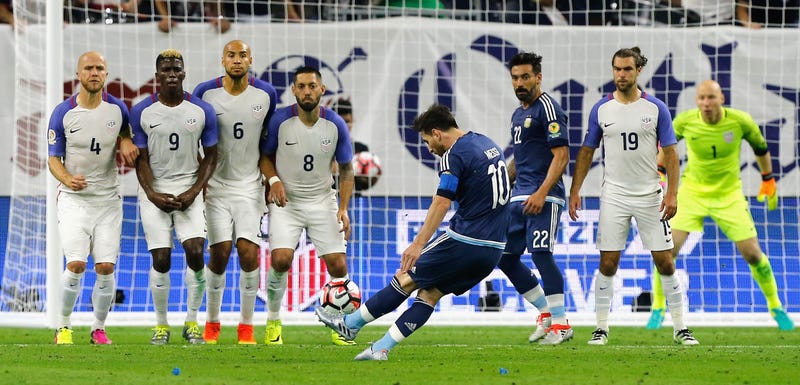
There are two ways to absorb the U.S.’s 4-0 pantsing at the hands of an overwhelmingly superior Argentina side. The first is fatalist, and is espoused by ESPN’s Doug McIntyre. It holds that this drubbing was so utter and so complete that there’s nothing constructive to take from the loss, no insight to be applied going forward, nothing to do but throw up your hands and say fuck! After getting off a grand total of zero shots on goal and losing the possession battle 67%-33%, I have to admit that’s a mighty tempting takeaway.
But there’s another way to look at this, endorsed by Sports Illustrated’s Grant Wahl, and it’s almost optimistic in its bleakness. The USMNT and their fans needed this wake-up call, the argument goes, not necessarily because the team was bad (they were not good), but because it’s hard to truly appreciate the greatness we aspire to without that greatness having its way with us. This is what a world No. 1-ranked team looks like, and for all the progress U.S. Soccer has made in recent years and decades, for all the pride justifiably taken from evolving into a competent soccer nation, the Argentines looked like they were playing an entirely different sport out there.
You saw it in the little things. The Argentinian first touches were immaculate: a booming ball would sail a couple dozen yards, touch an Albiceleste boot, and thud dead to the ground, as if by magic or magnets. American first touches rebounded into space, or right to pressuring defenders. That’s what a massive talent disparity looks like, one team executing the most basic of soccer skills just that much better than the other.
And you saw it in the big things, like Lionel Messi’s 32nd minute free kick goal:
That was unsaveable. It was perfect, the peak of ability. There are few teams as good as Argentina, and maybe no one as good as Messi, but if the U.S. hopes to one day field one of the world’s best teams, this is the skill gap they’re staring down. It’s intimidating to see how far they have to go, but it’s valuable to get a first-hand demonstration of exactly the heights they’re reaching for. It will be a long, long time before the USMNT gets there, if they ever do. But it’s nice to know what we’re working with. It’s not just that Argentina is better than the U.S.; we knew that. It’s seeing how much better they are.
Step one is realizing that we cannot yet hang with the likes of Argentina, no matter the standard American optimism (or maybe the American sense of exceptionalism). Step two, perhaps, is not being intimidated by that greatness. It’s one thing to be worse than a superior opponent; that’s fine. It’s another thing to play even worse than you’re capable of, just because you’re forever hyperaware of your inferiority. Jürgen Klinsmann said he thought his players’ wills were broken right out of the gate.
“I think it had to do a bit with the early [third-minute] goal,” U.S. coach Jurgen Klinsmann said. “But then you were trying to scream into the field: Go at them! Go! Become physical! Step on their toes! I think tonight you could clearly see in that moment once we were down 1–0 we had far too much respect. They smell that. They feel that. And they start to play their game with all the quality they have.
“After that early goal, I think our players could feel [Argentina’s] were just probably in every position on the field just better than we are.”
At this Copa America, the U.S. beat who they were supposed to beat, and lost to who they were supposed to lose to. They are who they are, and in the context of who they were decades ago, that’s a fine accomplishment. But in the wider soccer world, when you get to the late stages of a major international tournament, the U.S. are vast underdogs, and not necessarily the scrappy kind. This is not a knock—it is the truth. And we need to first grasp these painful truths before we can go about changing them.



